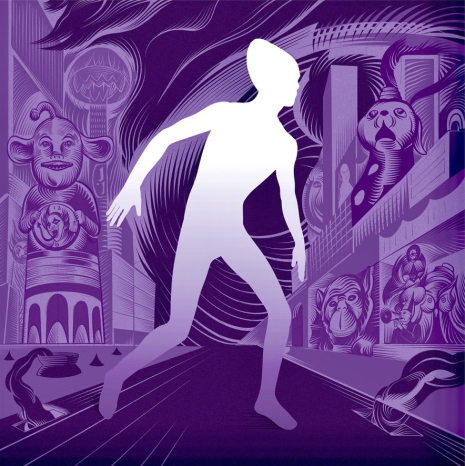
Illustration from ‘The Invisible Man’ by TOMO77
The poster that came with DEVO’s 1981 New Traditionalists album depicts the band sheltering an ethnically diverse triad of babies from the worst elements in American society: a horde of pirates, pushers, concert promoters, and Puritans looking to instrumentalize these newborns for their own unspeakable ends. Arrayed against this mob in matching JFK pompadours and Nutra work outfits, the men of DEVO face the challenge with poise and sangfroid, ready to open a cold can of whup-ass on these would-be baby-wreckers.
In the background, the uncredited artist represents the USA as a rolling lawn ornamented with a few topiary trees, their branches shaped into stacked orbs that taper like the steps of the DEVO energy dome, three leafy cocktail onions of descending size impaled on toothpicks stuck in the horizon. This is the landscape on which DEVO’s Gerald V. Casale stretches his legs in the music video for his latest solo release, “The Invisible Man.”
Once again, it’s “morning in America,” except for the glans-pated dweeb who dogs Jerry’s steps on the yellow brick road, subjecting him to sexual harassment, humiliation, and abuse. But as the story plays out, Jerry begins to suspect—his opponent’s neck tattoo of the D.R.I. logo notwithstanding—he’s once again doing battle with The Mark Inside, old Number One from The Prisoner.
Dangerous Minds caught up with Jerry by 21st-century videophone on November 22, 2022.
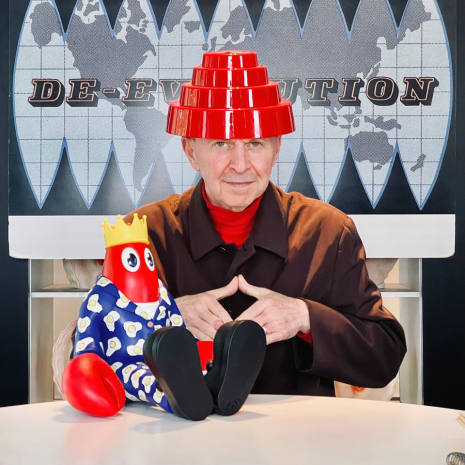
Before I ask you about “The Invisible Man,” it’s November 22. I’ve read a lot of DEVO interviews and I don’t know if you’ve spoken about this very much, so I thought it would be interesting to ask what you remember about the Kennedy assassination, and how you think that event affected your young minds.
Yeah! Probably, that was like the opening salvo in a barrage of timed traumas that just continued the next seven years, that pretty much twisted up everything in my life and set me on a fork in the road, kind of like the proverbial red pill in The Matrix.
I remember everything. I was in French class in my high school. We had a particularly sexy French teacher who was a graduate student, so she was probably, I don’t know, six or seven years older than us, and wore more trendy clothing, like herringbone-print skirts that were above the knee, and black boots, and little blouses that got the boys going. Anyway, suddenly the principal walked in, middle of class, and said, “Class, I have to tell you that the president of the United States has been killed today.” And [laughs] you know, you’re just, like, almost unable to process what you’re hearing, like it’s kind of real, but not really real? And then some of the girls start bursting out crying, and he goes, “And as a result of that, we decided to suspend all classes for the day and send you home.”
And it was interesting, ‘cause [laughs] a girl that I was really interested in, in this kind of puppy way where I didn’t even understand what I was doing, she was crying, and something in me, despite the fact that I was really freaked by what I’d just heard, and kind of understood how serious that was, or how frightening that was, to the United States, I of course used it to offer to walk her home [laughs]. So, you know, the little budding man in me started taking over, and I felt all, like, you know, it was a real, I don’t know, what was it, Stand By Me moment, like these coming-of-age comedies. And I walked her home, and I had my arm around her, and had her holding my hand, and I felt so, like, brave and excited, and scared at the same time.
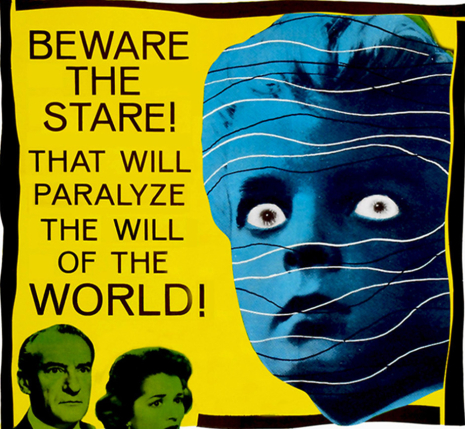
Detail from the ‘Village of the Damned’ poster
And then I didn’t go home right away. I thought I’m not going home, I’m not going home to my parents, ‘cause I was already at odds with them. ‘Cause they were blue collar and authoritarian, they didn’t understand me, they were policing my reading list and always criticizing me, and I felt like they didn’t understand how smart I was. So I decided to freak them out by just doing something I never did, which is I walked downtown and I went to the movie theater. I forget what was playing now; it was a black-and-white film, of course. It might have been Village of the Damned, English, great film.
And then, you know, when I got out of the theater it was already dark, ‘cause it was November in Ohio and it got dark at like five o’clock. And the moment I walked home, of course, I got attacked and talked to and screamed at. But then the television was on, and it was wall-to-wall coverage of the assassination. And, believe it or not, and I don’t know if other people have told you this, but you know the famous Zapruder film, where this guy was shooting, innocently, the arrival of the president in Dallas in his motorcade with a Super 8 camera, and it became the primary evidence of what the Warren Commission kind of bastardized. We saw it unedited, played over and over on TV. There were only three channels, they were all national, so the news—there was real news then, guys like Walter Cronkite just presenting things—would show it. I guess the country wasn’t centralized enough into some kind of CIA disinformation clampdown where you could see the impact, over and over and over! You could see the shots and her crawling on the trunk, Jackie Kennedy. You’d never see the Zapruder film that way again, because once the Warren Commission got ahold of it, they edited it, and what you saw afterwards in history, after that weekend, is never really the film.
And Ι saw the assassination then on Sunday, you know, we were Catholics and forced to go to church, so Sunday morning, television’s on, we’re watching [them] taking Lee Harvey Oswald from the Dallas police station to his court hearing, and we saw live the assassination of Jack Ruby killing Lee Harvey Oswald, right there, with my parents [laughs] while we’re waiting to go to church! I was fifteen.
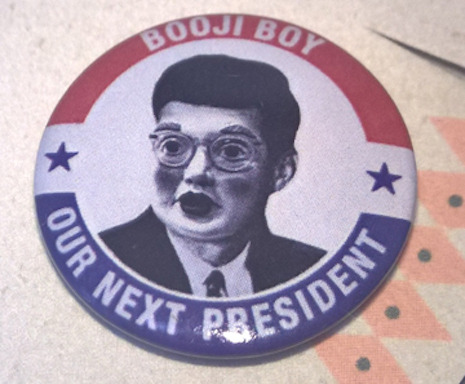
So it sorta blew a hole in everything, it sounds like.
Yeah! And then soon on the heels of that came the assassination of Martin Luther King, the assassination of Bobby Kennedy, the assassination of Malcolm X, as I was coming of age and reading and getting politicized and protesting against the Vietnam War. And it just all jelled. And it ended then with, you know, the National Guard killing four students and wounding nine on May 4, 1970, right in front of me.
There’s a kind of a straight line between those events, for you? Do you see it that way?
Yeah, it’s pretty much a three-stage rocket [laughs] right to supreme rage. Where you consciously put it all together, and you make a decision, and you’re on a path that sets you against all illegitimate authority forever. You’re a “difficult person,” resistive to authority. And that’s really what made me who I was, and really, I don’t think without it DEVO would exist.
I’m a big fan of the EZ listening stuff. There’s some EZ listening stuff on the new EP—
With vocals! With vocals, for the first time.
It reminds me a little bit of the Last Poets.
[Laughs] Well, I am one of the last poets now.
You are, Jerry. But as I look back at that stuff now, I wonder if there was a kind of idealism—there seems to be a real nostalgia underneath, maybe, for that New Frontier, early Sixties…
Yeah. And that’s understandable; we were fed a big heap of fantasy. And it was presented using science. When they showed you the future, it was based on innovation and technology and science. So the flying cars, the domed cities, the end of labor, it was a pretty fine middle-class fantasy of leisure and prosperity! It was a complete brainwash job.
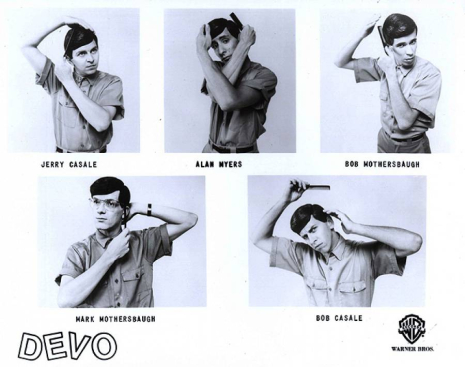
Promotional photo from 1981 by Robert Matheu (via Club DEVO)
I keep waiting for that World’s Fair vision to materialize myself.
Yeah, well, forget it.
I’ll be waiting a long time.
We soon figured that out. By ‘73, we had that mid-Sixties, midcentury, sanitized, idealized view of progress completely trashed, and we understood why. It was always propaganda. It was the propaganda of the brand America and freedom—”freedom” as a brand, as a buzzword, while we were busy subjugating big parts of the world through the CIA and through liaisons with dictators and juntas that were suppressing and killing their people, and it was always all about oil. It was always all about capitalist profit over any democratic rule of law, or ideals. ‘Cause those things are mutually exclusive.
That’s why the Chinese are so good. They looked at our capitalist system and they go, “You know, that’s pretty cool if you just get rid of democracy! We’re gonna adopt that. Screw communism! We’re going for capitalism but without this messy democracy crap.” You can’t have that—you can’t have people mucking it up, individuals that think they can think for themselves. Hence the number one Chinese proverb, which is “The nail that sticks out gets pounded.” [Laughs] So they’re hell-bent on conformity, and it’s worked out for them.
You don’t hear much anymore about how China’s going to have to liberalize.
No, you don’t.
People were saying that for years, and that’s sort of, ah, tapered off.
Well, after eight years of Bush and four years of Trump, and then two more years of self-appointed Trump, America’s moved so far to the right that they’re more looking to China as a role model. We will have what crazy Axl Rose called “Chinese democracy,” that’s what we’re gonna have here, for real! And it won’t be pretty.
Something about the Guns N’ Roses album as an illustration of that really is terrifying. ‘Cause it’s so expensive, too! It took ten years to make, more expensive than any multimillion-dollar movie…
And a terrible abomination of whatever they did right to begin with.
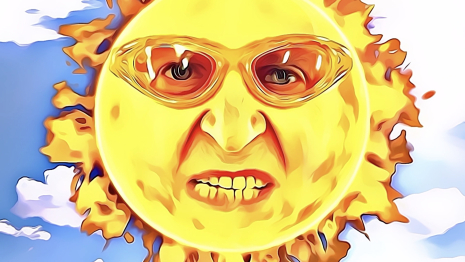
Jerry as Grandpa Sun in ‘The Invisible Man’ video
Right. The last time we talked, about a year ago, you were working on “The Invisible Man” and it was going to be a VR video… [I was mistaken. “Invisible Man” Executive Producer Jeff Winner points out that the VR video was in fact for the lounge version of “I’m Gonna Pay U Back,” not “The Invisible Man.”]
Yeah. We shot that, and unfortunately, it’s not in my control. I’ve seen it stitched together in the computer, everything is shot in this VR camera system that is proprietary and only works for an immersive experience, and then the rendering time is just obscenely long. But I’ve seen it! It works. I put the headset on, and I went in that world, and I walked up to me, and I walked up to Josh Freese, and Steve Bartek, and all these extras that are in it and girls on platforms and the whole thing. But this company, 4D, [the CEO] Paul Vowell, you would have to ask him. He lives in his own strange belief system and metaverse, and whatever plan he has for it isn’t clear to anyone at this point. No one has seen this except the people who were involved in it.
I love that it’s a continuous narrative. And since the end of this one sets it up for the narrative to continue in yet another way, my fantasy is that someday this will all be of a piece.
Jell. Yeah, mine too. I always try to focus on changing things from fantasy to reality, I mean, that’s what I did starting with DEVO. It’s easy to have ideas. I mean, ideas were never the problem. We were long on talk and very very short on action, and once that shifted over to doing instead of talking, everything exploded. So I do what I can now. DEVO, that was the Garden of Eden, because you had guys that were all on the same page, all collaborating, all sharing a vision, all putting all their energy into it, day after day, so you had the ideal situation of being able to produce. Nobody had any other priorities. This is what you lived for, this is what you couldn’t wait to get back together to do. Now, when I collaborate with Josh Freese and with Steve Bartek and with Paul David Hager and his brother, it’s when they have the chance to have some free time. They have lives, they have success stories, they have bills to pay. Not that I don’t, but I’m still the field marshal for Hey! I’m the guy that wants to do this more than anyone else, right?
And what I do like about it is, at least when we get together, it’s a taste of what DEVO was when everybody was excited to be together. There’s good chemistry, and we really like talking things out and trying things in front of each other, and people are smiling, and people are going “Yeah! Do that twice! Oh—do that faster! Oh, let’s do it over here!” And it’s fun! You know, back to that sense of fun. “Invisible Man,” it’s humorous, there’s a sense of fun in that song.
And of course, the Invisible Man. If you’ve ever in your life, like just about a hundred percent of people I know, had somebody who’s trying to get your goat, like somebody that has an animus towards you where it’s personal. They just don’t like you. You didn’t do anything to ‘em—you didn’t like screw ‘em in business, or defame them, or steal their girlfriend, or whatever. They don’t like even the way you sit down at a table and eat with a fork. And they’re out to fucking get you! You don’t know why, but it’s really creepy.
That’s how “The Invisible Man” started, but then I realized “The Invisible Man” ultimately came back around to the same subject matter I was dealing with in “I’m Gonna Pay U Back,” which is about gaslighting, and betrayal, and people turning on you and rewriting history. Ultimately, you’re dealing with yourself, because human nature is such that we all have a dark side. Like the Jungian philosophy, positing the dark side of humans, where we’re at war with ourselves—and you can see that, how that extrapolates into whole towns, whole states, whole countries. People, no matter how much good they do and how many things they create, they always have a way of undoing it, of letting evil, a palpable sense of evil, take over and absolutely dismantle and destroy everything that got created, and you’re just in this vicious Groundhog Day cycle.
So ultimately, the Invisible Man, besides the person that gets your goat, is yourself, the dark side of yourself that you’re trying to bury, but it keeps surfacing, keeps coming back. You have to confront it. I confront the Invisible Man in the song and video, that’s what I do. Me and the girls, we “hit him in the head and twist his neck / throw him in the ditch and drag him around.”

The Donut Twins take on the Invisible Man
Who are the Donut Twins?
They were one girl, who is a dancer. I met her during the shoot at 4D, the VR company in Culver City, when she was working on another project there, hired to dance in another project. And, you know, she loved DEVO, even though she’s a very young girl, she knew all about DEVO and she loved DEVO. She was interested in what I was doing, so I said, “When I do ‘The Invisible Man,’ you’re gonna be in it, okay?” And she goes, “Yes!” So we dressed her two different ways and made her a twin. ‘Cause everything I do with that technique with Davy Force, the brilliant animator [and] CG artist, is compositing. You shoot every element on green screen individually and you put it together, into the environment, before you run any of these graphics, AI programs that he uses and he tweaked that turn me and everything in it into a kind of a graphic, comic book, Marvel-universe-looking thing, that’s one step removed from live action. Which is what I wanted. As you said, I was trying to create this world again that’s an alternative world, as much as DEVO’s world was skewed from reality, it was its own thing, you know, it was parallel to the real world, but had its own terminology and characters and kind of rules, reality, I’m just doing that on a more personal level with what I do. And it helps to have a consistent graphic, video look, so that you believe in this world.
So I wake up in this “Invisible Man” video from the nightmare of “I’m Gonna Pay U Back,” and I decide I have to take a walk to shake it off, and I go outside, and I’m in a Teletubby world! And then at the end you find out I didn’t wake up, I only thought I woke up. We’ve all had those dreams where in the dream, we wake up, but we’re not [awake], it’s just a dream. So I have yet to wake up, but I promise you in the next one, I’m really waking up.
Oh no, real reality! That’s gonna be even worse, isn’t it?
Oh, all hell’s gonna break loose, yeah.
That’s one of my favorite things about this video. You wake up, ‘Ah, that’s over,’ go outside to take a walk, take some fresh air in the sun, and there’s the Invisible Man, grabbing your ass.
Yup. Hey!
I have to ask you about the Invisible Man’s wig, Jerry. Gee, is that, like, a chicken breast?
[Laughs] It’s a priapus. You know, you got your Prius, but that’s got no balls. The priapus has balls, but we didn’t include the balls. The actor had a shaved head anyway, and I just felt like his crown needed some jewels.
Because, look: the Invisible Man is a dickhead, that’s the point. Always. He’s always a dickhead.
From Claude Rains…
Yeah! Was he ever a good guy?
That’s true, I suppose he’s always kind of a schmuck, right?
Yeah, because he realized his power, and he embraced the dark side. Even if he started off as a good guy, once he realized what he could do by being invisible, you know—it’s like kids in high school thought they really had X-ray Specs that would work. When they ordered them from the back of the comic books, they thought they were gonna be able to see through girls’ clothing in school, and they were really mad when they couldn’t.

Jihad Jerry visits the Federal Building (via last.fm)
It’s an old thing from myth, the ring of Gyges in Plato.
Ah!
The original thing that the tyrant wants so that he can be all-powerful is to be unseen.
Yes. And the real people that pull the strings in the world that is actually real, not the one that we’re presented as a piece of entertainment on cable news, they are invisible. The front men are, like, Donald Trump and Elon Musk. They’re the ones that provide the diversionary tactics and the entertainment to get the population fighting against each other, so it’s like World Wrestling Federation, where, here’s the guy in the black outfit, you know, here’s the guy in the white outfit and the cowboy hat, and they get in the ring and you pick sides. And they fight, and you’re ready to kill the people that like the other guy, right?
Well, the guys that pull the strings, that are invisible, laugh their asses off at everyone every day. Because that’s exactly what they need. They want you mad, they want you scared, outraged, hating the other guy, they want you drugged up and laying on your bedroom floor with Oculus headsets on, so that you’re not organized, you’re not questioning what’s really going on and getting to the bottom of it. You’re just accepting this illusion that’s been fed to you, this propaganda. And you can see, it’s working better than ever. It’s more centralized and powerful, even on a global level, than ever. And that’s why you see the whole world now moving to the right. Many, many, even Western-style, democracies are crumbling, because the whole concept of the rule of law and democratic principles is being constantly eaten away at, like death by a thousand cuts. And it’s working. And it’s the invisible billionaires that are doing it.
Right, and like you said, it’s the Chinese model is the one that seems to be efficient and stable, as opposed to, if you look around our country…
It’s sad! They’re laughing their asses off every day, watching Marjorie Taylor whatever-her-name-is, Boebert, Hawley, all of ‘em. They’re clowns, they’re children spouting just complete filth, almost, like, on purpose. Like, “Here’s your lesson today, class: say the most absurd, offensive things you can. We’ll give you fifteen minutes. Think hard. Go as far as you want—you can’t go too far!” And of course, who’s in cahoots with that? Fox News, MSNBC, CNN, each one posturing for a different part of the electorate, for their viewership, keep them all divided, and yet give airtime to the most filthy, stupid, outrageous clowns that are just beating people’s brains into a pulp, where they just give up. They resign themselves, they’re in submission to chaos, to stupidity! Way beyond what DEVO could even have extrapolated from—we thought things would devolve, but they win. They out-devolved us. They did it! I’m impressed. [Laughs]
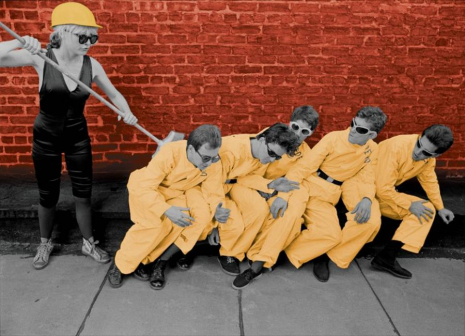
Debbie Harry cleans up NYC, 1977, photo by Chris Stein (via Club DEVO)
I was just rereading the great interview that you did with William S. Burroughs in Trouser Press—
Nineteen eighty-one!
—and I don’t know if this was inspired by the Church of the Subgenius, but one of the ideas you’re knocking around is a Church of De-evolution. I still hold out hope that that will materialize.
Yeah, I would have to say that you’re right, that it was inspired by “BOB.” Praise “BOB,” there he is on your shirt. ‘Cause we started to take it seriously, to go “Wait a minute.” When you realize the diabolical hucksterism of organized religion, especially the evangelicals—and we’ve seen scandal after scandal with Jim, what was his name, 700 Club—
Bakker.
Yeah, Jim Bakker, and…
Falwell.
Falwell, all of ‘em. They always end in—of course, like, you can’t be surprised—complete, supreme hypocrisy and scandal, like they’re doing everything that they told you not to do times a thousand, and they’re amassing huge sums of money, and they’re tax-free, and we’re going “You know what? DEVO has a better message for human beings than these evangelicals. And if we made it a religion, and we really did it, like legally did it, we’d also be tax-free!” [Laughs]
But, you know, I don’t think anyone had the resolve to actually push it through. I mean, I know I did, but it would have taken a village, so to speak. You have to have your lawyer, and your business manager, and everyone in the band behind it, ‘cause it’s a big deal, ‘cause you’re gonna be going and applying and you’re gonna be on the government’s radar, and the press is gonna be all over you—you have to have it together and thought out, you know. It would’ve gone way beyond the artsiness of Church of the Subgenius. We might have gotten in trouble. [Laughs]

DEVO kill for peace, 1984
One of the things that interests me about the Burroughs interview is like, even though his view of the world is so dark—I mean, whose view of the world was darker?—he still seemed to believe in progress in a way that you guys didn’t.
Right, we were too strident. I think he had gotten old enough that he could measure it. At that time, at least, he could say, “Compared to 200 years ago, if you look at disease, famine, fascist murders, the Holocaust, we’re doing better than that,” right? And yes, he knew that essentially, the brand of freedom was rotten to the core with hypocrisy, with racism, with sexism, with big money controlling everything.
I don’t know what year it was, but somehow, Burroughs was included on this TV special where, on Thanksgiving Day, he gave what was basically a eulogy to America, [though] he didn’t call it that. But Gus Van Sant was somehow involved in it. It was mind-blowing that this was on network TV! And there was a collage while he was reciting this dour piece of prose to America of, like—it’s almost like my video, “Beautiful World.”
Very much so.
But about eight years later, nine years later; it was around 1990, my memory of it. It was a high point [laughs] of subversion, like: how did this guy, William Burroughs, get on TV on Thanksgiving and deliver this to the American public? It was great!
It encapsulates so much about America and about his view of the world in such a short piece. It’s a wonderful thing, I agree.
Yeah!
Well, back to “The Invisible Man.” You were talking about the process—you recorded this in Josh Freese’s studio, right?
Yeah, down in Long Beach, yeah. And then Josh and I went over to Steve Bartek’s studio in Mar Vista, which is adjacent to Santa Monica, California, and continued working there. I mean, you wouldn’t even believe—he’s like the mad scientist, Steve, he’s got so many guitars and so much analog outboard equipment that is even hard to find now, back to the mid-Seventies straight through. You gotta remember that he was a member of the Strawberry Alarm Clock!
Right, right, right!
I mean, how cool is that? He still has some of those effects pedals and boxes you jack into. So it’s like a toy store for musicians, and it was fantastic! He goes, “Maybe we could try this! Here, I’ll use this 1962 Stratocaster, and we’ll put it through this, and this is a frequency analyzer from 1973.” And it’s fantastic, you know! And he’s still excited about that stuff.
Does he have any of those old Vox guitars with the onboard effects, or anything like that?
Yes he does, yeah. He’s got guitars I don’t even remember the brands of that are really rare, like Danelectros and… yeah. It’s like about seven hundred square feet of studio that’s all equipment and guitars on the wall.
Do you know him from the Oingo Boingo days?
Yeah, I met him back then, of course. And so that was interesting, having no contact for years and years and going, “Well, why didn’t I? I always liked him.” But it just doesn’t happen, you don’t think about it. You’re in your little DEVO world, they’re in the Oingo Boingo world, and your paths don’t really cross. I mean, I never even ran into him at any clubs or restaurants in LA, which is very strange. But when I got back together with him, it’s like collapsing time, it’s like no time had passed. You strike up a conversation, seamless, as if it’s 1980. It was great.
I love his guitar solo on the song. He’s really torturing the whammy bar.
[Laughs] Yeah.

Jerry on Steinberger bass in Oakland, 2018, photo by Cody Palmer (via Club DEVO)
Do you write on the bass? Do you write on keys?
I usually write on the bass, or on a guitar and bass, with a lot of things in mind about sounds and adding synth parts. And that’s how I collaborate with Josh, because I don’t have a studio now. Josh’s studio, he’s got a nice array of equipment and some retro synths that go back to more of the sounds that I love, that DEVO used, that Mark used in the beginning when he was playing the ARP Odyssey and the Minimoog. You know, I don’t like all the digital stuff as much. It doesn’t have the… odor, the stinkiness of rough edges.
And Josh is a great drummer, and so it’s easy to talk to him about beats. I’ll say something, and he goes, “Oh, you mean like this! Okay, but listen to this!” In other words, within two minutes you’ve got five options on a phrase, right?
He’s like the Zelig of drummers. “Here he is with Sting! Here he is with Nine Inch Nails. Oh, here he is with the Vandals! And here he is with A Perfect Circle!” And it isn’t like a studio drummer, where he made each of those people sound more like each other; he completely, like an actor assuming a role, he completely goes into that world, and it sounds like that world. You wouldn’t know it’s the same drummer. That’s how good he is at being Zelig.
No, he’s a phenomenon. I just saw the Danny Elfman show at the Bowl, and about halfway through I go, “Good Lord, that’s Josh Freese down there!” He pops up everywhere.
And guess who was directing?
Steve Bartek!
Steve Bartek, yeah.
Uh… dammit, I just forgot what I was going to ask you.
Well, I was going to ask you about Danny. I mean, he seems to be channeling Carrot Top.
[Laughing] He does, he looks so much like Carrot Top! Why he’s yoked, Jerry! He’s really ripped. It’s very strange.
Well, I hear he’s doing—I don’t know, this is hearsay—I hear he’s doing Human Growth Hormone stuff, and that he bulked himself out, worked out, grew his hair long and dyed it back red, like it was red in the beginning, in the Seventies, right? But it’s more than that. He’s on purpose doing almost like the evil, horror movie, Chucky thing; he brings his head down [tucks in his chin so he is looking up at the camera], looks at you from the top of his eyes, right?
The Kubrick thing.
And does the evil grin [twists up the corners of his mouth]. Yeah! He’s doing it all the time. Right, it’s Alex from Kubrick and it’s Chucky. I mean, it’s scary!
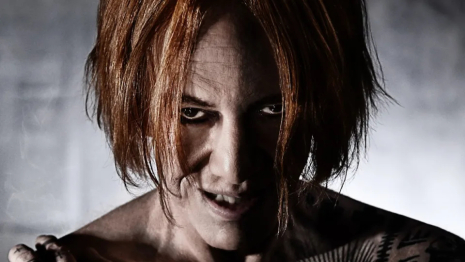
Danny Elfman, 2022 (via Yahoo)
It was a good show. Like you say, his appearance is really weird. It’s also very strange—like, he played “Insects,” the Oingo Boingo song, in a kind of nu-metal arrangement—I mean, decent nu-metal—
Yeah.
—but then it goes from that right into, you know, the Simpsons theme, and there’s an orchestra playing the Simpsons theme. There’s no continuity.
Right.
But, to his credit, when he was talking to the audience at one point during the show, he said “This show doesn’t make any sense, and neither do I.”
[Laughs] There you go! Nice disclaimer.
Something I meant to ask you about last time that slipped my mind. You’ve directed a ton of music videos now, you’re as much a music video director and film director as you are a musician. When you were working with Chuck Statler, I figure you already had some filming experience under your belt, but did you learn anything from him?
Oh, yeah! We were friends at Kent State University. I met him, not actually on campus; there was an art-film kind of theater in Cuyahoga Falls that we would all go to where you could see the cool stuff, and I met him there. And he overheard me offering one of my opinions about some black-and-white noir movie, and I can’t remember which one now, and he was a film student, and he knew the history of film, and he liked noir. And he had a 16mm Bolex. But he started talking to me, and we hit it off, so then we met on campus, and then I would go drive to Akron and visit him. And we started making little films together, where he was shooting me. They were nonsensical kinda short art films. And he would show me things he’d done.
He’s the one that taught me about lenses, about camera angles and editing, the nuts and bolts of how you can put something together to visually make sense, like, tell a story just with the techniques of editing and shooting. And so, by the time we got around to being able to do the ten-minute film, The Truth About De-evolution, I’d known him six years. I was drawing storyboards and shot lists and collaborating with him, and he brought crew to the whole thing, and we shot it all on a shoestring, do-it-yourself budget, and I worked tightly with him. And that became his troupe of people, and my connections with talent here in LA, and my good friend who was the head of a props company, he did all the designs for science-fiction movies, and he was a set designer as well, for films—so we had our little troupe, the way Scorsese had his troupe, you know?
So the early stuff with Chuck, it was another collaboration that was invaluable. I wouldn’t have gone the route I did unless I’d met Chuck in 1968.
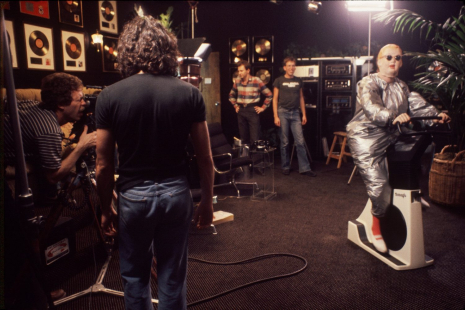
On set with Chuck Statler, Jerry Casale and Booji Boy (via Twin Cities PBS)
Since you brought up the troupe, I see that Rod Rooter is still reaming DEVO.
[Laughing] Yeah!
Michael Schwartz, is he an old friend?
Well, yeah. He was introduced to me by the guy I mentioned, the head of the props company and the set designer, John Zabrucky. When I was telling John what I needed for this interstitial movie that DEVO had this idea to show in concert [with] the head of this fictitious record company, this horrible guy, who was just a fictionalization of all the horrible people we had met in reality, he introduced me to Michael Schwartz. He goes, “I think you wanna use this guy!” [Laughter] And I met him, and he was kind of off-putting! So pimpy and so aggressive. And I thought, Well, you know, that’s the character, but it didn’t even seem like he had to act.
‘Cause he had grown up in Hollywood, and he had been on TV, he had been on Where the Action Is and dancing for Dick Clark, and out on tour, and Shindig! and all this. So he was this real insider, industry kind of talent who’d seen it all and done it all, so he knew these I guys I was talking about. He knew who they were and how they acted. He could just completely mimic it, you know, so it was frightening, ‘cause he was the nefarious CEO of a monopolistic record company! He just nailed it.
And people would go, “Well, that guy’s absurd! He’s over the top.” And it was like, this is really how they act, though! Even the way he dressed, it was not far off at all.
I grew up in LA, and that’s one of the things I love about that character. Exactly, like you say, people don’t believe [laughter] that there were actual human beings in Studio City in 1980 or whatever—that’s what they looked like, that’s how they talked.
And that’s how they talked! People go, “This is silly, this is so broad! This is so exaggerated, who’s gonna believe this?” But of course people just either were confused or they laughed their asses off at it, which was the best, if they laughed.
You’ve seen the music business and the movie business close up. Rod Rooter’s kind of a composite of all those figures from that period. Is there a different guy in that seat now in 2022?
Sure there is. We briefly touch on it in that new concert intro where we introduce Rod’s son, when he’s talking about how he’s retired now, and he turned it over to his son, and you see the son? Next time, it’ll be the son talking in his ballcap and chain, the white guy that wants to be black, you know? He’s the new CEO of Big Media. And that really was Michael Schwartz’s son, and Michael Schwartz’s son is a stand-up comic in the circuit.
Oh, wow!
Yeah! So he’s gonna do a good job.
Stewarding Big Media into the next generation.
Yeah. He’ll be believable.
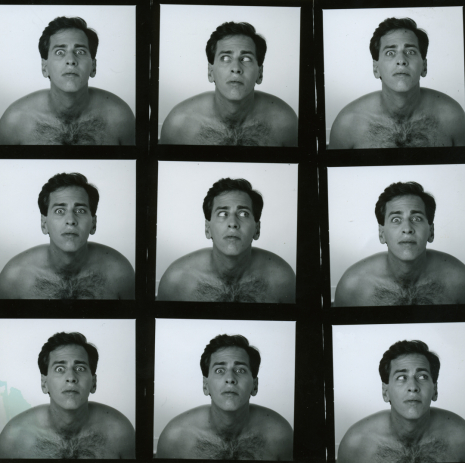
Bob Casale (1952-2014), via Twitter
These last two releases have been dedicated to your late brother Bob. To what extent did you guys have a kind of shared view of the world?
Completely! We grew up as brothers and we were on the same page. Bob was just a lot more of a low-key, stoic guy that wanted to resolve conflicts and dial down the heat, and I was your high-strung, field marshal, baton-twirling, screaming believer. And he understood me and tolerated me ‘cause brothers do that. But we worked so well together on the kind of unglamorous, nuts-and-bolts dirty work of DEVO, the blood, sweat and tears part of trying to put things together and trying to make a piece of composition work. Bob was an excellent engineer and really facile at finding sounds, where I’d go, “Look, we need something that sounds like a B-52 coming in here to come over that drum fill!” And five minutes later he’s got it. We worked well together, that’s all I can say. We spent hours working together that helped the foundation of DEVO, helped move things along and get things going on a practical level, so that songs got developed and finished.
It’s heartbreaking on so many levels: just as a brother, somebody I talked to all the time, bounced things off of, commiserated with; but then, the working thing was gone, too. I don’t have that wingman anymore. I don’t have that, and it’s just devastating. ‘Cause I could call him practically anytime, and go, “Hey, do you have time tomorrow afternoon, we could go into the studio and do this?” And he’d go, “Yeah!” He was always ready. That’s what he liked doing.
And because DEVO had been put on ice, he was relegated to being Mark Mothersbaugh’s employee to pay the bills. And that was kind of strange; that’s kind of ironic and strange, that you take this band, and they’re all collaborators, and it’s a brain trust, and on some level you’re equal—nobody’s anybody’s employee, for God’s sake. You’re in the employ of the vision. You’re all part of DEVO, Inc. You’re the five musketeers. So it was strange when that got turned on its head. But what he really still liked doing was not being an employee, and going back to creating, which is what we did.
There’s nothing—there is no thing like that, like being an artist, where you sit down and come up with something that nobody asked you to come up with. You’re not solving any problems. You’re not being paid work-for-hire, like “Hey! Can you do an album and it sounds like David Bowie? We’ll give you $500,000!” Maybe that’s what we should have done. [Laughs] But anyway, everything else is secondary creativity. Like when he was working with Mark on composing for a kids’ show, Rugrats or something, there’s certain things they want. They come in and they’re telling you what to do all the time. “Make it sound more like this,” or “We need this here for twenty seconds, and it’s gotta be happy.” So you’re solving their problems for them, and that’s more like secondary creativity. And it’s a talent and it’s a discipline all of its own.
But what we loved to do was the primary thing, where you create something that you don’t know if anybody’ll want. And sometimes they don’t; but there’s no greater thrill than when they do. When they hear it and can’t imagine not having wanted to have heard that already. I mean, that’s what I did with Jimi Hendrix, the first record, I still remember. If somebody had told me, “This is what you’re gonna be listening to in six months,” if they played me some crystal ball precursor, and then you buy it and put it on, and you can’t imagine not having it, not having heard it already. You can’t imagine that you didn’t have it forever. And I just wore that vinyl out, over and over and over, I couldn’t quit listening to it. That is the thrill of being an artist.
The rewards are different for that kind of work.
And the risks are huge.

15.60.75, the Numbers Band, while GVC (second from left) was bassist, 1972 (via cleveland.com)
Did you and Bob start out playing together?
No. No, uh-uh. As a matter of fact, what’s funny is, I didn’t know that he could play guitar until he’d been playing guitar for about four years. Because I had left home; I had a terminal rift with my parents, that turned out not to be terminal in the end, but I flew the coop, I couldn’t take it. I had really very little contact with Bob at that point, who was four years younger than me. He pursued a different path. He didn’t go to Kent State University or any other university, he went to a technical school to learn how to be a radiologist. So when I first started re-contacting him and hanging out with him, he was already a licensed radiologist. And he was newly married, and I go over to his house, and he’s got like a couple guitars and some amps, and I’m like “Bob! Hey!”
Then he starts playing guitar, and I couldn’t believe it! And he had a definite style, so that when I talked him into coming into the DEVO fold, he came up with really great, original kinds of things that showed me that, even if you’re not in contact with your brother, you share some kinda DNA, you can’t help it. ‘Cause he’s the one that came up with “Satisfaction” [sings six-note guitar figure]. He made that up. And early DEVO songs that I was writing, that were more blues-oriented, like “I’m A Potato” [sings lead guitar line]. He came up with that, and many others. They were odd. He liked Captain Beefheart, independent—I didn’t even know that he would know who Captain Beefheart was. So it’s just really nice to know that he had this aesthetic and I had nothing to do with taking him there.
I didn’t realize he’d worked with radiation, either, which is an interesting detail.
Perfect, right? He could’ve just not done DEVO and done very well for himself. I feel guilty that I suckered him into that world [laughs].
How’s the wine business?
Yeah, that’s a sore point. I’ll tell you, the wine business is not good for small producers like myself, boutique, artisanal producers, because between the—let’s just call it “climate change”—but between the earth burning up and two years of COVID protocol bullshit, the business was destroyed for small producers. And so big distributors took over completely, and unless you’re producing twenty, forty, a hundred thousand cases, you’re not in the game. And for two years, no bars and restaurants were buying wine; they were trying to survive by doing take-out and getting rid of their inventory. They were selling bottles off their wine list at wholesale prices ‘cause you couldn’t drink it in the restaurant, ‘cause you couldn’t go in the restaurant. I’m self-distributed in California, which was ninety percent of my distribution, and I would go to bars and restaurants, and taste them on my wine, and I got a few dozen accounts, and the accounts just evaporated. And then the harvests come a month early, and the yield is tiny, because the sun beats the shit out of the grapes, and they’re ready to pick when they’re half as big as they should be. So you paid for those rows and blocks of grapes, but now you’ve got half of what you used to get, and now you’ve gotta make wine from it. So it’s not fun.
The big boys are trying to either change the varietals that they’re growing up in Northern California, or they’re moving out of Northern California and going all the way to Washington to grow Cabernet and Chardonnay and Pinot noir, because the climates that made those grapes great for a hundred years in Napa are gone. Napa’s becoming “Napa Springs,” like Palm Springs. I mean, if you look at the humidity and the heat, it’s ridiculous. No humidity, super heat. No rain.
My friend who’s in a graduate program in Ann Arbor sent me a shot from a local wine store. There’s a “Michigan wines” shelf. Not something I ever expected to see, as someone born in Michigan.
Yeah, that’s right, exactly. Where grapes grow is shifting.
Jerry, it’s a great pleasure talking with you. I’m a big fan of yours. Thanks for your time.
Thank you. Till next time. [Salutes] Duty now!
[Salutes] Duty now, Jerry.
Visit geraldvcasale.com to buy “The Invisible Man” EP and other attractive, high-quality items direct from the source. Two additional remixes of “The Invisible Man” by Martyn Ware (The Human League, Heaven 17) were released on digital streaming platforms on December 7.
Previously on Dangerous Minds:
DEVO’s Gerald V. Casale talks about his new music videos and the vertiginous pace of de-evolution!